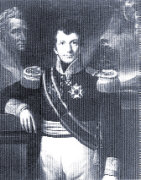1830 | |
| Johannes van den Bosch arrives as the new Governor-General, begins the "cultuurstelsel" or "culture system". Forced cultivation of indigo is introduced in the Priangan. First steamboat arrives in the Indies. Nederlands Zendelinggenootschap (Dutch Missionary Society) begins offering education to "native" children. December 4 Van den Bosch officially organizes the Dutch forces from the Java War into the Oost-Indische Leger, or "East Indies Army" (later KNIL). | |
1831 | |
| Nederlands-Indië government manages a balanced budget. Dutch forces fighting the Padri in Sumatra reach the Bonjol area. U.S. ships shell coastal villages in Aceh in an action against piracy. |  Gov.-Gen. Johannes van den Bosch It was only after the Java War that the Dutch began to think about a real empire in the Indies. From 1830 to the end of the century, the Dutch began a drive to take complete control of the areas from Aceh to New Guinea, and to extract as much profit as possible from the valuable areas, such as the Priangan area of West Java. Revenues from the Indies paid for as much as one-third of the Dutch government's budget in the mid-1800s. These monies helped to finance the industrialization and development of the Netherlands in the 1800s. The burden fell especially upon the Netherlands Indies, since the Dutch had lost many of their other colonies to the British during the Napoleonic wars (including South Africa and Sri Lanka), and since Belgium with its business and industry broke away from the Kingdom of the Netherlands in 1830. The government was called the Netherlands Indies, or Nederlands-Indië in Dutch, or Hindia Belanda in Indonesian today. |
Thursday, August 25, 2011
History of Indonesia (5)
Tuesday, August 2, 2011
History of Indonesia (4)
1800 | |
| VOC formally dissolved on January 1; properties revert to Dutch government. Sultan of the Kraton Kanoman in Cirebon is banished to Ambon by the Dutch. A low-level rebellion breaks out under Bagus Rangen. | During these times, the Netherlands was allied to or occupied by Napoleon's France. Until Daendels arrived, not all Dutch officials in the Indies approved of the government in Amsterdam. Around this time, many ports and markets that had been monopolized by the VOC were opened to free trade. This turned out to be profitable for the local government, which then allowed the Netherlands Indies officials to be more independent of the Napoleonic government in Amsterdam (until events of war reduced trade around 1807-1808). |
1801 | |
| British take control of the Minahasa region, remaining until 1816. | |
1802 | |
| Melaka and Maluku are returned from British to Dutch control by the Treaty of Amiens. Dutch begin sending military reinforcements to Java. | |
Subscribe to:
Posts (Atom)